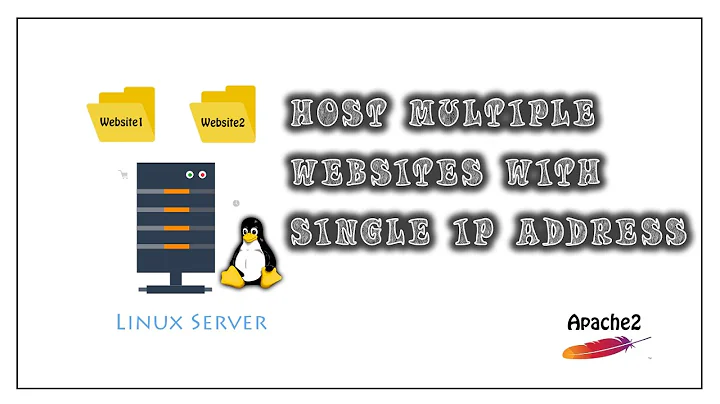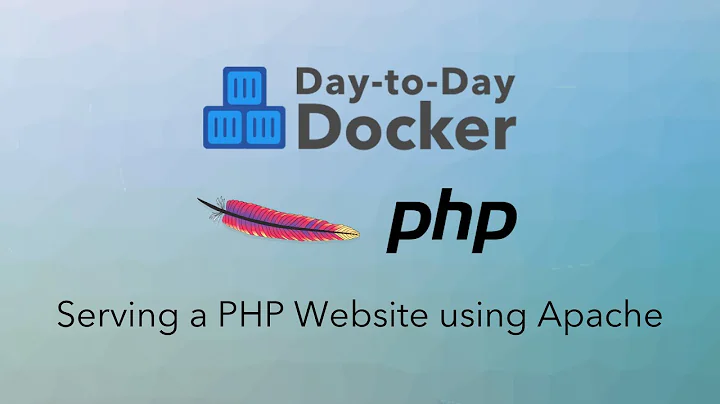Can a single Apache server handle both Tomcat and PHP?
Solution 1
Yes you can do that. Essentially you have to run the Apache (+ PHP) server on one port and the Tomcat server on a different port.
You can expose the 2nd port to the outside world, and have your URLs use either port
80for Apache / PHP or (say)8080for the Java server. This simple, but you may find that upstream firewalls prevent a remote web browser from connecting to any port other than80.You can configure your Apache server as a reverse proxy for the Java server. So for instance, the Apache server might recognize that
http://site.com/javaapp/foo.htmlis for the Java server, and relay requests for that URL tohttp://localhost:8080/javaapp/foo.html.
There is a whole chapter of the Apache documentation about configuring forward and reverse proxies using mod_proxy.
Solution 2
Can a sinle apache server handle both tomcat and php?
Yes, you need both apache and tomcat installed, but you can configure apache to redirect (transparently for the user) all JSP requests to tomcat using AJP protocol.
See more here: http://www.datadisk.co.uk/html_docs/java_app/tomcat6/tomcat6_apache_server.htm
Solution 3
Yes.
Apache HTTPd can delegate to Apache Tomcat using ModProxy or ModAJP, and can be configured to do so based on the domain, path or file extension requested. Your Apache HTTPd configuration of PHP would remain the same.
You would need to configure Apache Tomcat to not listen on port 80, and then configure the Apache HTTPd proxying solution of your choice to talk to Tomcat on a different port.
Here's a starting point for more information: Apache + Tomcat: Using mod_proxy instead of AJP
Solution 4
This is possible using Apache Reverse Proxy,
I configured one Apache virtual host that serves one PHP website (Drupal) and one java (tomcat, for business logic) that are stored in the same server using a reverse proxy with 2 locations, the advantage of this configuration is that it doesn't expose the port that Tomcat is using on the URL which was mandatory for me for security reasons.
This is how I achieved this:
<VirtualHost *:80>
ProxyPreserveHost On
DocumentRoot "/srv/www/htdocs/"
ErrorLog /var/log/httpd/app_error_log.log
CustomLog /var/log/httpd/app_log.log combined
ServerName myapp.com
#Drupal PHP Content, stored at / as the main front end website.
<Location />
ProxyPass http://localhost/
ProxyPassReverse http://localhost
Order allow,deny
Allow from all
</Location>
#Tomcat/java content, secondary site used to process payments and business logic:
<Location /javaApp>
ProxyPass http://localhost:8080/javaApp/
ProxyPassReverse http://localhost:8080/javaApp/
Order allow,deny
Allow from all
</Location>
</VirtualHost>
Restart Apache:
service httpd restart;
Test your reverse proxies: PHP/Drupal (In my case i'm using drupal but can be any PHP code):
http://yourserverip/ or http://localhost/
Java:
http://yourserverip/javaApp or http://localhost/javaApp
I hope someone can find this useful. I had a hard time trying to figure this out. :)
Regards.
Related videos on Youtube
Hacker
Hi, This is Pradeep here. Bacially a web developer. Work experience completely on LAMP Stack, Drupal. "I'm convinced that the only thing that kept me going was that I loved what I did." - Steve Jobs 1955-2011
Updated on July 17, 2022Comments
-
Hacker almost 2 years
I have a requirement as to have a single server with both a Java application and a PHP application, running on the same Apache. Is this possible?
This question may be very silly but I have no clue about java requirements or installation procedures.
Can I do such a thing that as to have the java application running on one port and the PHP application on another port, both on the same Apache?











![[Solved] Phpmyadmin & PHP not Executed on Apache2 Server](https://i.ytimg.com/vi/assWTvmtrSA/hq720.jpg?sqp=-oaymwEcCNAFEJQDSFXyq4qpAw4IARUAAIhCGAFwAcABBg==&rs=AOn4CLD5bO7u0EMQhyvPcvUkV5LL9MRrRA)